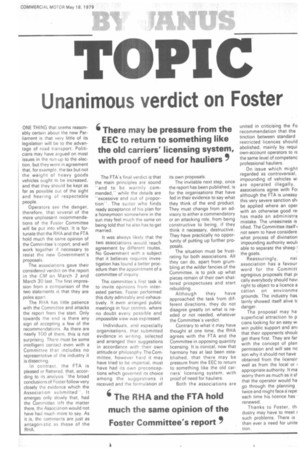T O P I C
Page 63

If you've noticed an error in this article please click here to report it so we can fix it.
Unanimous verdict on Foster
'There may be pressure from the EEC to return to something like the old carriers' licensing system, with proof of need for hauliers'
ONE THING that seems reasonably certain about the new Parliament is that very little of its legislation will be to the advantage of road transport. Politicians may have argued on most issues in the run-up to the election, but they were in agreement that, for example, the tax but not the weight of heavy goods vehicles ought to be increased, and that they should be kept as far as possible out of the sight and hearing of respectable people.
Operators see the danger, therefore, that several of the more unpleasant recommendations of the Foster Committee will be put into effect. It is fortunate that the RHA and the FTA hold much the same opinion of the Committee's report, and will work together if necessary to resist the new Government's proposals The associations gave their considered verdict on the report in the CM on March 2 and March 30 last. The first impression from a comparison of the two statements is that they are poles apart.
The RHA has little patience with the Committee and attacks the report from the start. Only towards the end is there any sign of accepting a few of the recommendations. As there are nearly 100 of them, this is not surprising There must be some intelligent contact even with a Committee that includes no representative of the industry it is dissecting.
In contrast. the FTA is pleased or flattered, that, according to its analysis ''the broad conclusions of Poster follow very closely the evidence which the Association submitted". It emerges only slowly that, had the Committee left the matter there, the Association would not have had much more to say. As it is, the comments are just as antagonistic as those of the RHA.
The PTA's final verdict is that the main principles are sound "and to be warmly commended,while the details are -excessive and out of proportion". The suitor who finds ready acceptance of his plan for a honeymoon somewhere in the sun may feel much the same on being told that he also has to get married.
It was always likely that the two associations would 'reach agreement by different routes. No Government with a subject that it believes requires investigation has found a better procedure than the appointment of a committee of inquiry_ The committee's first task is to invite opinions from interested parties. Foster performed this duty admirably and exhaustively. It even arranged public meetings in four centres, where no doubt every possible and impossible view was expressed.
Individuals, and especially organisations, that submitted evidence in writing, selected and arranged their suggestions in accordance with their own attitude or phi losophy The Committee, however hard it may have tried to be impartial, must have had its own preconceptions which governed its choice among the suggestions it received and the formulation of its own proposals.
The invitable next step, once the report has been published, is for the organisations that have fed in their evidence to say what they think of the end product. They must change from an advisory to either a commendatory or an attacking role, from being constructive to being, if they think it necessary, destructive. They have practically no opportunity of putting up further proposals.
The situation must be frustrating for both associations. All they can do, apart from grumbling at the wilder fancies of the Committee, is to pick up what pieces remain of their own shattered prospectuses and start rebuilding.
Although they have approached the task from different directions, they do not disagree greatly on what is needed or not needed, whatever the Committee's verdict.
Contrary to what it may have thought at one time, the RHA agrees with the FTA and the Committee in opposing quantity licensing. It is ironical, now that harmony has at last been established, that there may be pressure from the EEC to return to something like the old carriers' licensing system, with proof of need for hauliers.
Both the associations are united in criticising the Fo recommendation that the tinction between standard restricted licences should abolished, mainly by requi own-account operators to r€ the same level of competenc professional hauliers.
On issue which might regarded as controversial, impounding of vehicles w are operated illegally, associations agree with Po! although the FTA is uneasy this very severe sanction sh, be applied where an oper with an otherwise good re, has made an administra mistake. The uneasiness is tified. The Committee itself not seem to have considere what process of divination impounding authority wouli able to separate the sheep I the goats.
Reassuringly, nei association has a favour word for the Committ egregious proposals that pi cally everybody should havi right to object to a licence a cation on environme grounds. The industry has tainly showed itself alive tt danger.
The proposal may ha superficial attraction to p cians looking for an easy w win public support and an) that their opponents shoulr get there first. They are far with the concept of plan permission and will see no son why it should not have obtained from the licensir well as from the local or appropriate authority. It ma worry them as much as it sF that the operator would ha go through the planning twice and might face irepe each time his licence has renewed.
Thanks to Foster, th dustry may have to meet such problems. There is than ever a need for unite tion.




















































































































